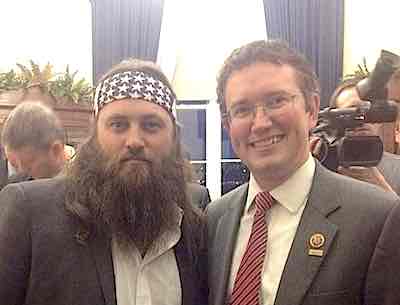Massie was born in Huntington, West Virginia. He grew up in Vanceburg, Kentucky, and met his future wife, Rhonda. He earned a bachelor’s degree in electrical engineering and a master’s degree in mechanical engineering from Massachusetts Institute of Technology.[3]
In 1993, at MIT, he and his wife started a company called SensAble Devices Inc.[4][5] Massie was the winner in 1995 of the $30,000 Lemelson-MIT Student Prize for inventors.[3] The company was re-incorporated as SensAble Technologies, Inc., in 1996 after partner Bill Aulet joined the company.[4] They raised $32 million of venture capital, had 24 different patents, and 70 other employees.[6]
Massie sold the company, and he and his wife moved back to their hometown in Lewis County.
Last year and the year before, he forced a vote on an appropriations bill to prevent government forcing companies to install back doors in their products. He’s most pessimistic about the national debt and the fact that when interest rates return to normal levels, the country will be paying up to a trillion dollars a year to service its debt. That’s bigger than the military budget.
Second-term RepublicAn congressman Massie may be the staunchest defender of liberty most people have never heard of. The Massachusetts institute of Technology grad recently gave an interview to Reason TV:
Q: What makes you optimistic?
A: Technology and innovation and the human spirit to improve our own lives. You know my background as an engineer. I have 29 patents. I’ve invented things. And when people say, “Will our children be better off than we were?”…I say, “Yes, but it’s going to be due to the engineers, not the politicians.”
Q: What are the most important votes coming up for a libertarian-leaning Republican?
A: I think we can force some votes on the privacy issue. Last year and the year before, I forced a vote on an appropriations bill to shut down government forcing companies to install back doors in their products. That amendment was attached to an appropriations bill that got thrown away and then an omnibus was later done. But it’s important to get the votes, because then you can see where the congressmen stand.
Q: In a recent Republican debate, all the candidates were like, “Apple should unlock that phone [belonging to one of the San Bernardino terrorists] and be done with it.” What did you think of that?
A: I’m sad. Now that Rand is out of the race, the libertarian voice is gone. And I think it’s also untethered some of [the remaining] candidates to become more neocon-ish.
Q: In terms of the presidential race, what’s the best outcome?
A: I’m really pessimistic. I don’t think there is a good outcome in 2016. The one argument for libertarians to vote Republican that still remains is the Supreme Court nominees.
Q: What was the most important issue for you in your student days and is it still a big deal for you?
A: My gateway issue into liberty was gun rights, because I grew up in a rural area where everybody had guns. And then I went to college and realized people in college wanted to ban these things.
Q: Over the past 20 or 30 years, Second Amendment rights have really seen an enormous increase in their legal standing as well as their popularity, don’t you think?
A: The gun rights political effort is probably something everyone should study, because they’re fighting above their weight class. When I was young, if you wanted to carry a concealed weapon, you had to be a sheriffs deputy. And now you can do that in most states with minimal hoops to jump through.
Q: What makes you pessimistic these days?
A: I’m most pessimistic about the national debt and the fact that when interest rates return to normal levels, 5 percent interest on $20 trillion is a trillion dollars a year. That’s bigger than our military budget, it’s actually our entire discretionary spending combined.
Q: And we only spend $4 trillion a year, so that’s 25 percent off the top.
A: Well, of the four trillion, three of that is for entitlements. There’s a trillion that funds the things people think about, like roads and bridges, NASA, the military. That trillion [in interest payments] will wipe out all of the things that Congress actually votes on.
Auto Amazon Links: No products found.

